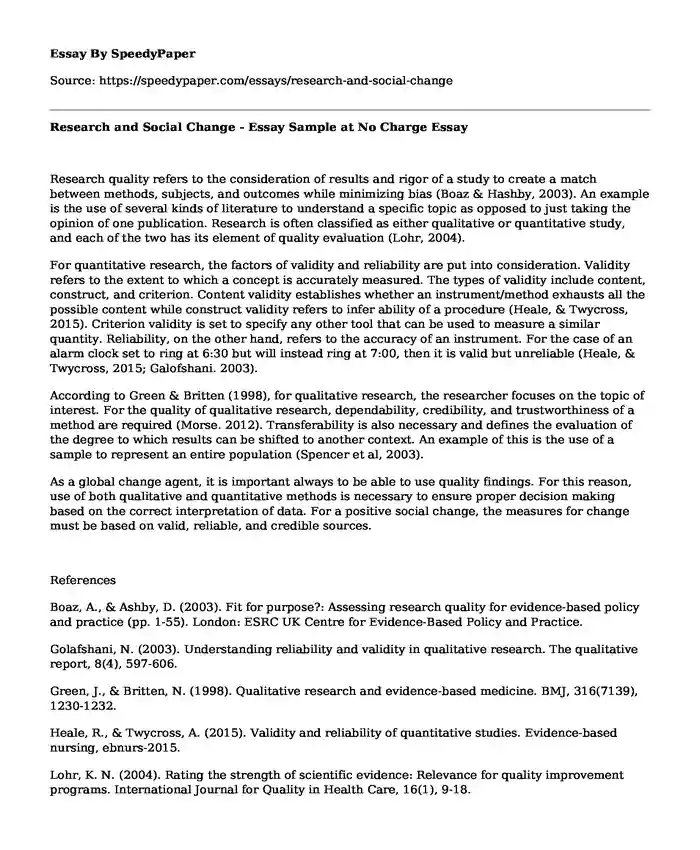
| Type of paper: | Essay |
| Categories: | Research Social change |
| Pages: | 2 |
| Wordcount: | 451 words |
Research quality refers to the consideration of results and rigor of a study to create a match between methods, subjects, and outcomes while minimizing bias (Boaz & Hashby, 2003). An example is the use of several kinds of literature to understand a specific topic as opposed to just taking the opinion of one publication. Research is often classified as either qualitative or quantitative study, and each of the two has its element of quality evaluation (Lohr, 2004).
For quantitative research, the factors of validity and reliability are put into consideration. Validity refers to the extent to which a concept is accurately measured. The types of validity include content, construct, and criterion. Content validity establishes whether an instrument/method exhausts all the possible content while construct validity refers to infer ability of a procedure (Heale, & Twycross, 2015). Criterion validity is set to specify any other tool that can be used to measure a similar quantity. Reliability, on the other hand, refers to the accuracy of an instrument. For the case of an alarm clock set to ring at 6:30 but will instead ring at 7:00, then it is valid but unreliable (Heale, & Twycross, 2015; Galofshani. 2003).
According to Green & Britten (1998), for qualitative research, the researcher focuses on the topic of interest. For the quality of qualitative research, dependability, credibility, and trustworthiness of a method are required (Morse. 2012). Transferability is also necessary and defines the evaluation of the degree to which results can be shifted to another context. An example of this is the use of a sample to represent an entire population (Spencer et al, 2003).
As a global change agent, it is important always to be able to use quality findings. For this reason, use of both qualitative and quantitative methods is necessary to ensure proper decision making based on the correct interpretation of data. For a positive social change, the measures for change must be based on valid, reliable, and credible sources.
References
Boaz, A., & Ashby, D. (2003). Fit for purpose?: Assessing research quality for evidence-based policy and practice (pp. 1-55). London: ESRC UK Centre for Evidence-Based Policy and Practice.
Golafshani, N. (2003). Understanding reliability and validity in qualitative research. The qualitative report, 8(4), 597-606.
Green, J., & Britten, N. (1998). Qualitative research and evidence-based medicine. BMJ, 316(7139), 1230-1232.
Heale, R., & Twycross, A. (2015). Validity and reliability of quantitative studies. Evidence-based nursing, ebnurs-2015.
Lohr, K. N. (2004). Rating the strength of scientific evidence: Relevance for quality improvement programs. International Journal for Quality in Health Care, 16(1), 9-18.
Morse, J. M. (2012). All Data are not equal. Qualitative health research: Creating a new discipline. Left Coast Press.
Spencer, L., Ritchie, J., Lewis, J., & Dillon, L. (2003). Quality in qualitative evaluation: A framework for assessing research evidence. London: National Centre for Social Research.
Cite this page
Research and Social Change - Essay Sample at No Charge. (2022, Mar 29). Retrieved from https://speedypaper.net/essays/research-and-social-change
Request Removal
If you are the original author of this essay and no longer wish to have it published on the SpeedyPaper website, please click below to request its removal:
- Essay Sample on African-American Male Victims of Police Brutality
- Why Is Obesity a Problem in Society - Get an Answer from This Free Essay
- Cyber Briefing Questions, Essay Sample
- Literary Essay Sample: Responses to Prompts on Hills Like White Elephants
- The Oregon Trail Game Worksheet | Useful Essay Sample for Everyone
- Essay Sample on Artwork Evolution: Comparison of Mona Lisa and Self-Portrait With a Monkey
- May 2, 2019
Popular categories




